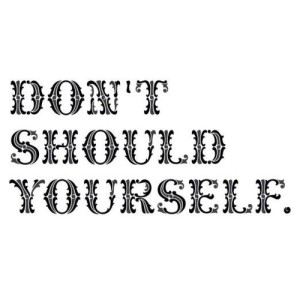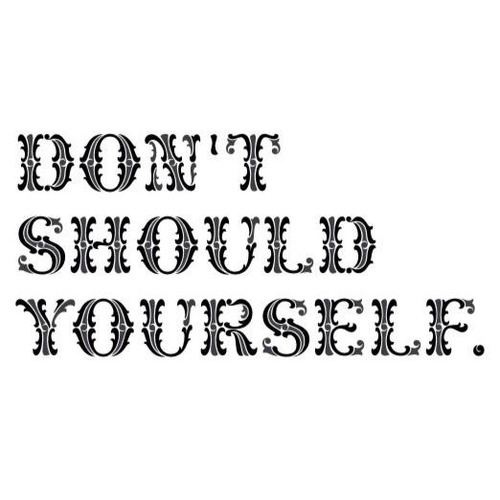I really loved this “Lifestyle: De-Stress” Tip from Patrick McGrath.
 THIS YEAR, STOP “SHOULDING” ALL OVER THE PLACE
THIS YEAR, STOP “SHOULDING” ALL OVER THE PLACE
By Patrick McGrath, Ph.D.
OK, funny title, but serious matter. The word “should” has been written about for years by therapists who specialize in Cognitive Behavioral Therapy — a type of therapy that looks at the relationship between the way that you think, feel and behave.
The word “should” plays a role in anxiety, depression and general stress because it is an absolute word. Once you have said something “should” be done a certain way, then it must be done that way or else you are a failure. Why a failure? Because “should” is an all-or-nothing word, and you either fail or you succeed. If the only way that you can succeed is to do what you “should” do (which is just a small dot on a big target) then it goes without saying that if you did not do what you “should” do, then you failed.
So, a few pointers to try out:
RECOGNIZE THAT “SHOULD” LEADS TO A LOT OF ARGUMENTS.
If I tell you you “should” do something and you do not do it, then I will be mad at you for not doing what I think you “should” do. I do not care if you do not want to do it or not — all I care about is I think that you “should” do it, so that is good enough logic (or lack thereof, really) for me. As you can see, this is how a lot of arguments start — two people disagreeing about what should be done when in reality, both of them are just expressing their opinion about what they would like to have done. If you want to stop a lot of arguing and stress in your life, stop demanding that people do things the way you think they should be done and allow them to get things done how they want them done — maybe you will even like their results better!
REPLACE “SHOULD” WITH OTHER WORDS OR PHRASES.
These include things like “I wish,” “I want,” “I hope for,” “I would like” or “It would be nice if.” When you use these phrases, there is a less absolute feel to your discussion, and therefore, less conflict. You can actually talk about why you would like something to be a certain way, instead of just saying, “Because it should be that way.” If that response would be frustrating to you, then imagine how others feel when you say it to them.
[Change Your Vocabulary*] “SHOULD” IS ALMOST ALWAYS NEGATIVE.
“I should have done this, they should have said that.” “Should” points out what you did not achieve — it never points out what went well. So, if you want to stay positive, change your vocabulary. Also, do not only search for things that did not work, but point out the things that went well — try to focus on two or three positives for every negative that you pick out. This will be a great way to start to feel better about yourself and what you do and not just down about everything that is going on.
These tips really resonate with me. I tend to be somewhat absolute – declaring things as always, never and should. I hadn’t considered that what I “should have” done leads me down a negative route where none of the things I “did do” seem good enough. Language can be powerful – especially the language of our own thoughts. This focus on a word choice reminds me of the use of don’t versus can’t (which is especially helpful in this time of year of resolutions, too). I am resolving to be kinder to myself this year and being concious of how I frame things in my thoughts and words is a good start.
What do you think? Should you pay attention to the shoulds in your life?
*Added by me to make the tip list all start with an action. Yes, I am that anal about writing. I should lighten up! (Or maybe “it would be nice if I could lighten up!”)


